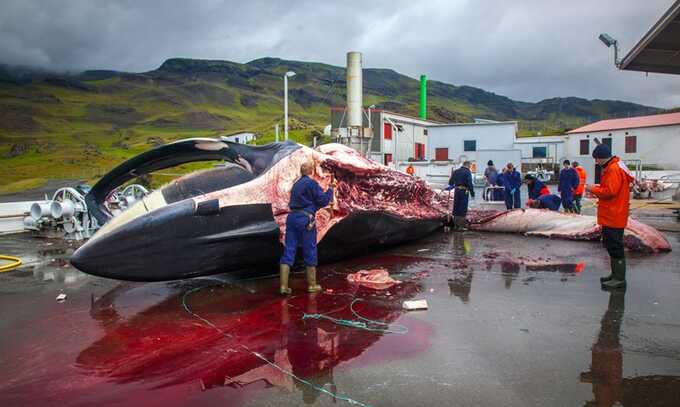Iceland issues license to the country’s last whaling company to hunt 128 fin whales

Conservationists criticise ‘disappointing’ and ‘dangerous’ move to allow harpooning of fin whales after curbs last year
Iceland has granted a licence to Europe’s last whaling company to kill more than 100 animals this year, despite hopes the practice might have been halted after concerns about cruelty led to a temporary suspension last year.
Animal rights groups described the news as “deeply disappointing” and “dangerous”.
Hvalur, an Icelandic company run by Kristján Loftsson, will now be permitted to kill 128 fin whales over this year’s hunting season. Last year, just 24 fin whales were killed after a government-commissioned report found harpooned whales took as long as two hours to die and new regulations were introduced, delaying the whaling season.
Iceland is the second country, after Japan, to allow fin whaling to resume this year.
Fin whales, the second-largest mammal in the world, are listed as vulnerable to extinction on the red list of the International Union for Conservation of Nature. Their numbers have recovered since bans on hunting were introduced in many countries from the 1970s.
In granting the permit, Iceland’s food, fisheries and agriculture minister, Bjarkey Olsen Gunnarsdóttir, said her decision was not necessarily in line with her views or those of her party, the Left-Green Movement.
“Nevertheless, I have to follow the laws and regulations, and this is my conclusion now,” Gunnarsdóttir told RÚV, the Icelandic national broadcasting service.
Campaigners claimed that a recent report by Mast, Iceland’s food and veterinary authority, had failed to demonstrate any significant improvements in animal welfare for the 2023 hunt compared with the year before, despite the implementation of new regulations aimed at reducing suffering.
Patrick Ramage, director of the International Fund for Animal Welfare, said: “It’s hard to fathom how and why this green light to kill 128 fin whales is being given. “There is clearly no way to kill a whale at sea without inflicting unthinkable cruelty.”
Luke McMillan, an anti-whaling campaigner with Whale and Dolphin Conservation, said: “It is unbelievable and deeply disappointing that the Icelandic government has granted [this], defying extensive scientific and economic evidence against such actions.”
The decision set a “dangerous” precedent for commercial whaling around the world, he said, as well as undermining global conservation efforts.
Iceland’s previous fisheries minister suspended whaling after a report concluded that the 2022 hunt did not comply with the country’s animal welfare legislation, as the whales took too long to die.
The report, by Mast, found that some harpooned whales took two hours to die and it questioned whether hunting large whales could ever meet animal welfare objectives.
An expert working group, set up subsequently to look into whether the hunt could be modified to meet welfare laws, concluded there were grounds for making improvements to hunting methods.
However, a Mast analysis of last year’s whale hunt, seen by the Guardian, concluded that while the efficiency of killing whales in 2023 appeared to be better than in 2022, the difference was not statistically significant, possibly due to the small numbers of animals killed in 2023. There were 148 whales hunted in 2022.
Last month, Japan announced that fin whaling could resume, adding the cetacean to a list of other species it allows to be caught commercially.
Although populations of fin whales are reportedly increasing, thanks to regulation of commercial whaling, they were still classified as endangered as recently as 2018 and also face other pressures, including climate change.
Read more similar news:
Comments:
comments powered by Disqus

































